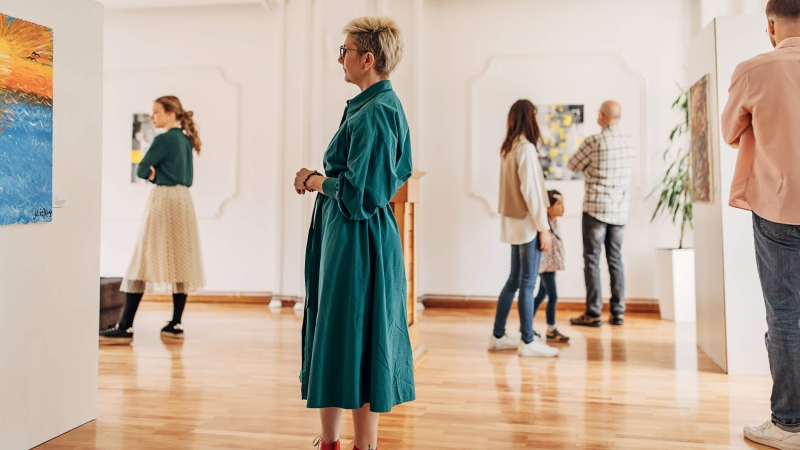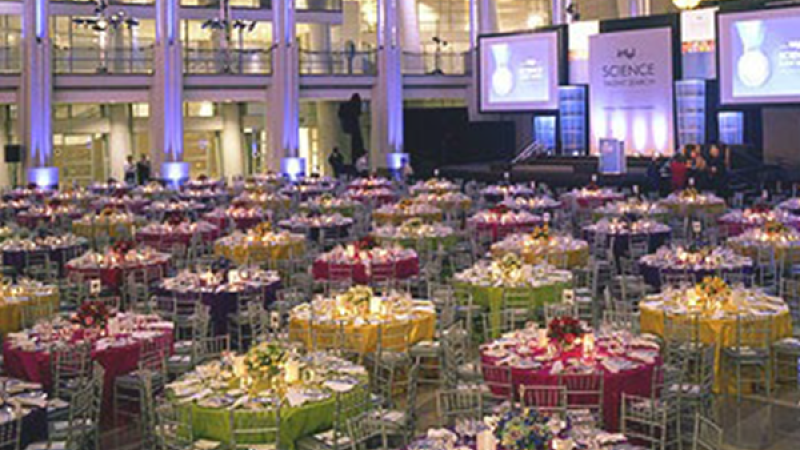Across the country, museums and art galleries have struggled to bounce back from the pandemic and its impact on the domestic tourism industry. Limited business hours, staffing issues, and visitor safety concerns left many museums operating at partial capacity, with some closed entirely for months. In 2023, the American Alliance of Museums found that on average, museum attendance is still down 30% from pre-pandemic levels. As more patrons are eager to get outside and experience life again, community calendars are beginning to fill with art museum events and activities.
If you’re looking for ways to build buzz for your museum, raise your profile as an event venue, or strengthen bonds in the community, this is the post for you. We’re exploring unique and fun art museum events that increase visitor attendance, drive additional revenue, and help your venue build stronger business relationships. From exclusive high-end pop-up exhibits to family-friendly functions, you’ll find a business-boosting event idea perfect for your museum.
Hold art museum events patrons actually want to attend
1. Interactive art exhibitions
Interactive art turns spectators into participants by involving the viewer in some way or another. Instead of simply viewing the art, museum patrons and event attendees can experience it and create a lasting memory of the event. By walking through, moving around, or touching the installation, spectators become part of the artwork, helping the piece achieve a purpose.
2. Pop-up exhibits
Drive additional museum revenue by organizing one-of-a-kind pop-up exhibits. By nature, pop-up events come and go quickly, often on the same day or in the span of a few hours. The exclusivity of pop-up events and their vanishing nature harness the power of FOMO—or the fear of missing out—to drive interest and attendance. Look to pop-up retailers and restaurants for inspiration, and host unexpected art guests, collections, and exhibitions at the museum.
Look for traveling artists scheduled to come to your town. Reach out to them beforehand to see if they’d be interested in showcasing their work at a pop-up exhibit. Create a social media marketing strategy ahead of time, and launch a content-rich campaign to announce the event. Have a plan in place to blast the announcement all over the web. Share content on Facebook, Instagram, TikTok, and other social media platforms. Connect with remote visitors by livestreaming the event on social media or streaming-specific platforms like Twitch.
3. Eclectic artisan market
Similar to a farmer’s market, an artisan market is a regular gathering of artists selling their wares. Community members and other visitors can stop by, shop, and experience an eclectic mix of local artwork. Include a diverse group of artisans, artists, and community creatives selling handcrafted pieces and original designs, such as:
• Painters
• Metalworkers
• Sculptors
• Photographers
• Crafters
• Jewelry makers
• Leatherworkers
• Potters
• Weavers
• Glassblowers
Embrace the local culture and feature resident artists who do the same while collecting a small fee from participating vendors. Invite food trucks, coffee shops, and interactive entertainers, like face painters and caricature artists, to join in on the fun.
4. Family-friendly functions
Art museums should be fun for all ages, so include kid-friendly activities in the museum’s event calendar. Make family-focused activities more accessible by offering a mix of ticketed and free events. Promote activities and programs that are fun for the whole family, such as:
• Story reading series
• Craft classes
• Children’s theatre
• Science + art workshops
• Cultural festivals
Offer seasonal family-friendly events, like a summer tie-dying workshop, and celebrate the holidays. Host trick-or-treating and a costume contest for Halloween, and make festive ornaments to celebrate the Christmas season.
5. Free community events
Grow relationships with businesses and organizations in your area by hosting community events that are open and free to the public. Create a mural in the heart of the community or work together to install environmentally friendly sculptures along a nearby natural path. Organize live demonstrations, social service programs, and safety classes. Raise your community profile and build relationships with community members from all walks of life by making art, history, and education accessible to everyone.
6. Citizenship preparation classes
Promote diversity and inclusion in events while using the museum’s greatest asset—art—to serve the community. Host citizenship preparation classes that use paintings, photographs, crafts, and other art pieces to communicate lessons to English Language Learners. Take inspiration from The Nelson-Atkins Museum of Art in Kansas City, MO.
Nelson-Atkins offers citizenship classes that utilize pieces from the museum’s extensive collection to teach students about Native American culture, America’s revolution, the Civil War, civil rights, voting rights, and even geography.
7. Enrichment groups
Encourage community art lovers to experience your museum in a new way by forming a connection to local art history, unique artists, and like-minded peers. Host classes, workshops, and other enriching events to promote inclusion and a better quality of life for nearby residents, museum members, and other visitors.
The Museum of Fine Arts (MFA) in St. Petersburg, FL, hosts a monthly club for anyone who would like to attend. Each of the monthly selections relates to current happenings and exhibits at the museum, drawing attention to both the club and featured artwork. Consider organizing a book club based on the art at your museum. Invite local artists and artisans to teach workshops and classes. Form bonds with new visitors, and ask returning visitors what enrichment opportunities they would like to see the museum provide in the future.
Learn about how events have changed in the last few years
8. Networking socials
Invite community members to socialize, enjoy a glass of wine, and taste the finest hors d’oeuvres the museum offers in a casual, after-hours setting. Networking events and social meetups present a fantastic opportunity to advertise the museum’s event space to local professionals. Show off your service capabilities, layout options, and meeting rooms without it feeling like a sales pitch.
Add a twist to networking events by adding a theme or inviting a special guest. For inspiration, check out Happy Hour with the Historian, a regular event hosted by St. Petersburg’s Museum of History. On the second Thursday of each month, a speaker visits the museum to share unusual and unexpected history lessons with museum guests. The museum’s 2022 speaker lineup included environmentalists, baseball experts, and pirate enthusiasts—to name a few. A top-rated lecture series, Happy Hour with the Historian sells out consistently.
9. Fundraisers
Partnering with local nonprofits and art-focused organizations can help new and emerging museums make valuable connections and increase their exposure in the community. To solidify your position as a reliable event venue and as a trusted community partner, raise awareness and funds by hosting nonprofit events for reputable organizations.
Include a mix of charity events to attract community members with various interests, like galas, auctions, concerts, and carnivals. Utilize charity event software solutions to streamline the planning process and organize your event information. Promote fundraisers on social media and throughout the community.
10. Museum scavenger hunt
Appeal to gamers, puzzlers, and art fans alike with a museum scavenger hunt. Pair exhibits and museum spaces with a unique QR code. The British Museum famously partnered with the BBC to produce The History of the World in 100 Objects—which featured a museum scavenger hunt, a book, and a series on BBC radio. You could simply provide the list and allow your guests to explore the items freely, or gamify the process.
Instruct visitors to snap a picture of the code to learn more about a specific photograph, painting, artifact, or room in the museum. Not only will participants receive leave with a deeper understanding of some of the museum’s finest pieces, but they will also receive a digital badge for each artwork or location code they upload.
Allow visitors to track their visits and progress via the museum’s website or an event app. Include a digital scavenger hunt map that identifies which areas of the museum they have visited and which are remaining. The more museum visits they make or exhibits they see, the better the rewards they receive for their loyalty (e.g., free tickets, café credit, VIP access to upcoming art museum events). In addition to driving repeat visits, rewards programs build consumer trust, driving loyalty and additional revenue in the process.
11. Wedding expo
Opening the museum to weddings can increase event revenue during event season and help market the museum to a new audience. Carve out your place in the wedding market by hosting a wedding expo at the museum. Invite designers, planners, florists, pastry artists, DJs, and other wedding vendors to participate.
In addition to promoting the venue and introducing your hotel to event bookers, hosting a wedding expo or bridal show can be a major money-maker. Capture as much revenue as possible for the event by offering multiple ticket options at a range of price points (e.g., general admission, early access, and VIP packages). Charge a small fee for vendors to participate in exchange for promoting their businesses with the event.
Build booking buzz outside the expo by creating a venue listing on Cvent Wedding Spot. Promote the museum as a premier venue, advertising event spaces, layouts, wedding services, package options, and more. Reach thousands of couples and planners visiting the site to find the perfect venue for their dream wedding. Raise your profile as a special event host by becoming a high-demand destination wedding venue in your area.
How do you bring in more wedding business this year?
12. Virtual events
Art museums may house historical works and ancient artifacts, but that doesn’t mean you must follow old-school customer engagement strategies. Embrace technology and utilize the power of smartphones instead. Use virtual and artificial reality to bring the museum to remote customers, long-distance web visitors, and other members of your online audience. Promote virtual event experiences, like a photo-realistic 3D tour of museum gardens or a guided virtual tour of the whole museum.
Enable remote viewers to become immersed in the museum’s public areas, visit rotating exhibits, and wander the grounds. Encourage in-person visitors and members to download your exclusive app if they want to participate in virtual events, keep up with future art museum events, and be the first to receive notifications when new collections or exhibits are on the way.
How often should art museums host events?
Museums should regularly host events to keep attendance, momentum, and word-of-mouth marketing levels high. Fill the event calendar as much as possible without overbooking, stretching resources too thin, or overworking museum staff. Include a mix of public events to attract attention and new customers, as well as private events (e.g., parties, weddings, reunions) to maximize the revenue potential of your space.
Add some new art museum events to your calendar now!
One of the best ways to boost business and attract more visitors is to host art museum events that people want to attend. Ask museum members and visitors what kind of events they’d like the museum to offer, and think about what’s lacking in your community. Does anyone host a carnival in the spring or an affordable summer concert series? If not, could you fill that gap? If you’re located 20 to 30 miles from the nearest winery, consider working with regional wineries to accommodate a tasting event at the museum.
Advertise all upcoming activities, lectures, classes, and other art museum events. Keep members of your audience up to date with the latest and greatest in museum news, and make sure they know when something exciting is coming up. To help you get the word out, check out our best venue marketing strategies that work next.







